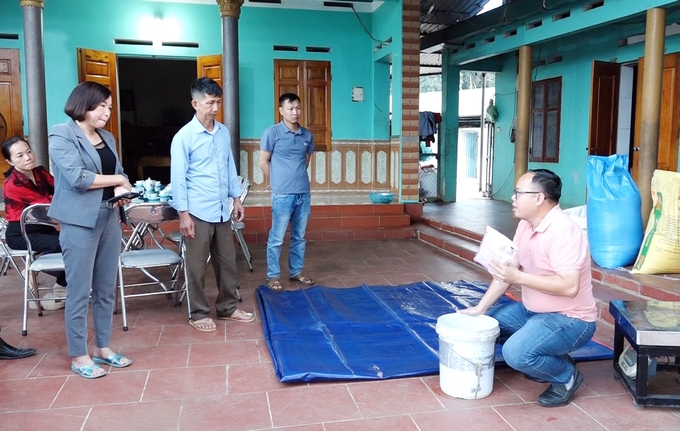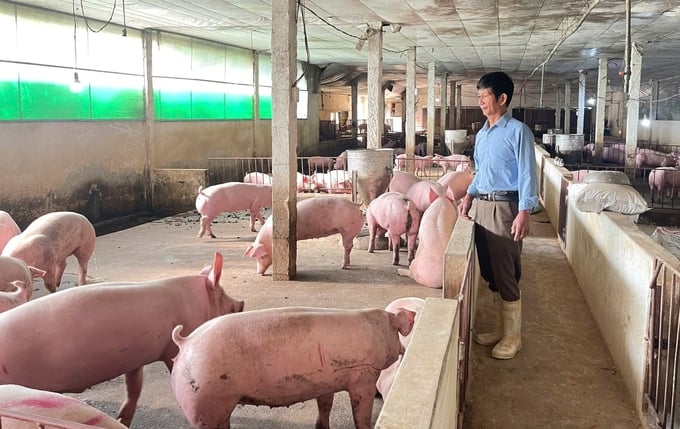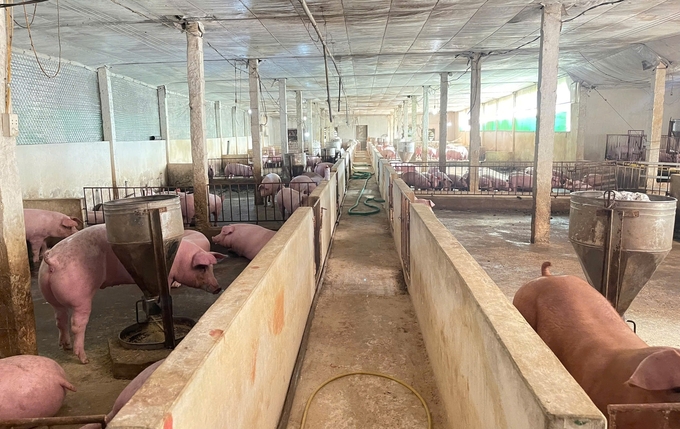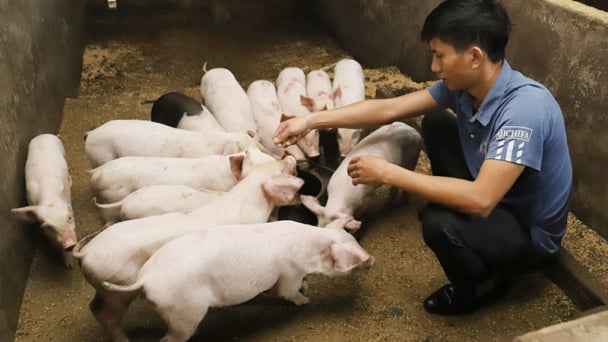June 19, 2025 | 21:33 GMT +7
June 19, 2025 | 21:33 GMT +7
Hotline: 0913.378.918
June 19, 2025 | 21:33 GMT +7
Hotline: 0913.378.918

Dr. Nguyen Tien Dat guides households on the technique of adding green tea dust to the feed mixture. Photo: QL.
Phu Luong District Agricultural Service Center collaborates with Thai Nguyen University of Agriculture and Forestry to organize a training session on techniques to raise pigs for meat. The main topic is the natural feed supplemented with Thai Nguyen green tea dust for families in Phan Me commune. The pilot model is at Nguyen Van Phuong's household in Co 2 hamlet, Phan Me commune with a scale of 25 pigs during a period of 6 months.
According to Ninh Thi Thang, Deputy Director of the Phu Luong District Agricultural Service Center, households participating in the model will be instructed on techniques for raising pigs for meat using natural feed mixed with green tea dust. The model is supported with funding to purchase green tea materials. "After implementing the pilot model, the professional agency will evaluate its effectiveness and replicate it to pig farming households in some communes of this province," she said.
Dr. Nguyen Tien Dat, head of the project, directly provides guidance on the required techniques and how to mix the natural feed. The main ingredients used for feed are mainly of natural origin (rice bran, corn bran, soybeans, etc.) and prepared in mixed proportions according to the different growth stages of pigs. The supplement ingredients calculated for 100 kg of mixed feed include Thai Nguyen tea leaf dust (3 kg), Probiotics (500 g), Premix minerals (1 kg), and salt (300 g).
Green tea powder is produced from dried tea leaves, then crushed and added to the mixture of natural feed. Households are also instructed on farming and caring procedures, specific disease prevention and treatment solutions for pigs fed with natural feed, and techniques for making biological bedding.

Nguyen Van Phuong's pig farm in Co 2 hamlet, Phan Me commune. Photo: Quang Linh.
Having the technology transferred, Nguyen Van Phuong hopes that the model of raising pigs for meat using natural feed supplemented with green tea dust will help livestock gain good resistance and become less susceptible to diseases, thereby improving the meat quality.
“Through the press, I learned about the model of raising pigs with feed supplemented with green tea dust and the positive effects it brings. Now that the scientist who carried out the project and the professional agency have given clear instructions, I can commit to following the transferred procedures. If the transfer goes smoothly, I will expand my herd and proactively use the natural feed mixture,” Phuong said with excitement.

The pig farming technique which uses feed supplemented with green tea dust is being transferred to localities in Thai Nguyen province. Photo: Quang Linh.
Step 1: Prepare 40 l of clean water into a tank, add 3 kg of rice bran and 3 kg of corn bran to the tank, and stir well. Add 500 g of probiotics to the water tank, and stir well. The probiotic solution tank will activate the yeast for 1-2 hours, then proceed to ferment the food.
Step 2: Prepare the ingredients in proportion. Use the mixer to mix the ingredients in order from the largest to the smallest mass. Put the corn bran into the mixer, then add the rice bran, turn on the machine, mix the above two ingredients well. Next, put the soybeans into the mixer, mix well.
Ingredients of small quantities (green tea dust, minerals, vitamins, salt) must be mixed first with crushed corn to increase the mass, then mixed with other ingredients to ensure even distribution in the feed mixture.
Step 3: Slowly add the prepared yeast solution into the mixer, mix steadily for 3 - 5 minutes. Check the areas where the feed is not moistened or lumpy, stir the mixture and yeast solution thoroughly.
Step 4: Move the feed mixture to a container to start fermenting the probiotics. Leave the feed mixture for 1 - 2 hours, then use a plastic bag to seal the mouth of the container, and secure it with a rubber band. Close the lid and store for 1 to 2 days, then check the fermented feed to see if it meets the requirements: the feed has a pleasantly mild fragrance, does not have a foul smell, and is not moldy. The mixed feed can be used for 3 - 5 days.
Translated by Samuel Pham

(VAN) Biodiversity is being threatened by traditional remedies made from wildlife. Traditional medicine and humans must change to live in harmony with nature.

(VAN) Agrifood investment and finance solutions for people and the planet.

(VAN) Microplastic contamination has become pervasive in seafood, posing unprecedented challenges for food safety and marine ecosystems.

(VAN) Proactively using vaccines, combined with transport control and enhanced surveillance, is the only viable path toward biosecure and sustainable livestock production in Vietnam.

(VAN) Located in the southeast of Ho Chi Minh City, the Can Gio Mangrove Biosphere Reserve is considered the ‘green lung,’ a solid shield protecting the city.

(VAN) To address plastic pollution, closing the plastic recycling cycle will bring significant economic and environmental benefits.

(VAN) According to the Binh Thuan Department of Industry and Trade, in the first five months of 2025, Binh Thuan's dragon fruit export turnover increased by 20.65% compared to the same period last year.